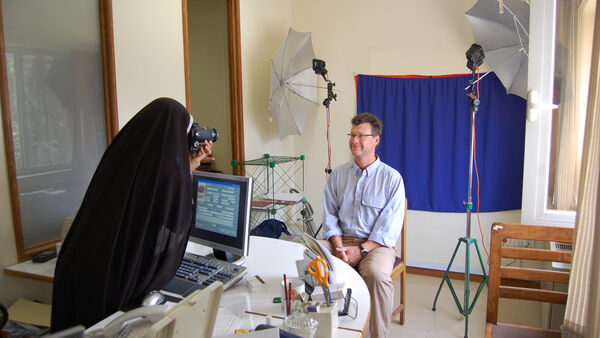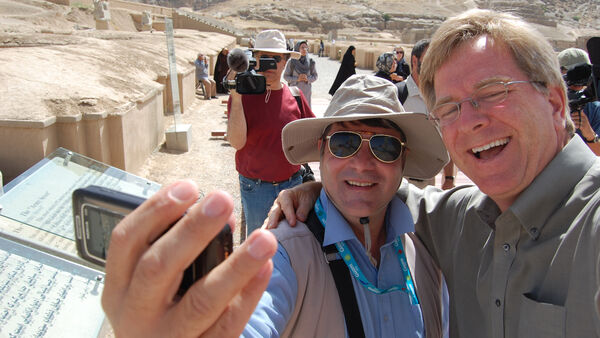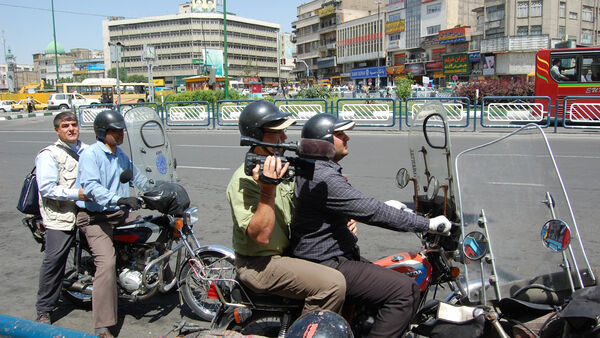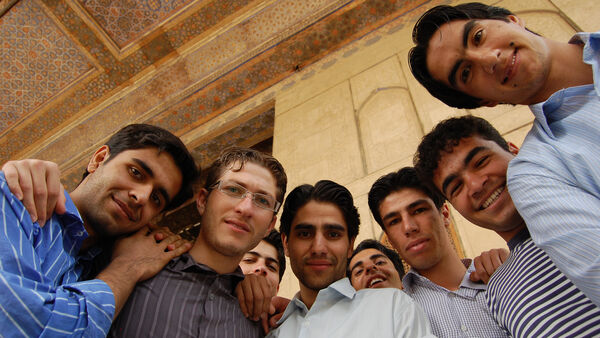Iran Travel Journal (part 2)




Jumping Through Hoops in a Society on Valium
Iran has presented our crew with some unique hurdles. Today we dropped by the foreign press office to get our press badges. There a beautiful and properly covered woman took mug shots for our badges and carefully confirmed the pronunciation of our names in order to transliterate them into Farsi.
The travel agency — overseen by the "Ministry of Islamic Guidance" — has assigned us what they call a "guide," but what I'd call a "government minder." Our guide/minder, Seyed, is required to follow our big camera wherever it goes — even if that means climbing on the back of a motorcycle taxi to follow our cameraman as he films a "point-of-view" shot through wild traffic (photo page 16). When he's not holding on for dear life, Seyed slips a tiny camera out of his pocket and documents our shoot by filming us as we film Iran.
While this sounds constraining, Seyed is a big help to our production. Whenever we film a place of commercial or religious importance, a plainclothes security guard appears. Then we wait around while Seyed explains who we are and what we're doing. No single authority is in charge — many arms of government overlap and make rules that conflict with each other. Seyed makes our filming possible.
Permission to film somewhere is limited to a specific time window. Even if we are allowed to film a certain building, it doesn't mean we can shoot it from the balcony of an adjacent tea house (where we don't have permission), or from any angle that shows a bank (banks cannot be filmed).
Many readers of my blog have skeptically predicted that our access to Iran would be very limited, to only the prettiest sights. (Meanwhile, Iranians I meet are convinced that I'll doctor our footage to make Iran look ugly and dangerous.) In reality, it's far less restrictive here than I expected. Seyed has not stopped me from going anywhere. And, when pushing the limits set on our filming, I actually feel a righteous confidence. Some subjects are forbidden for reasons of security (banks, government, military) or modesty ("un-veiled" women). But because the government understands I'm not filming an "exposé," we are free to shoot all that we need to — including some subjects that are far more potentially provocative, such as anti-American or anti-Israeli murals (more on these later). Bottom line: I already feel I am getting the Iran I came for.
And we are free to talk to and film people on the street. When our camera is rolling — or when Seyed's is — it reminds me of my early trips to the USSR, when only those with nothing to lose would risk talking openly. But at other times, such as when the crew sets up a shot, I'm free to roam about on my own and have fun connecting with locals. Routinely, I'll look up from my note-taking or memorizing my lines to see curious locals gathered, greeting me with smiles, and wanting to talk. When I explain where I'm from, the smiles get bigger. I have never traveled to a place where I had such an easy and enjoyable time connecting with people. Locals are as confused and fascinated by me as I am by them. Young, educated people speak English.
Even early in the trip, it's clear that the people of Iran are the biggest joy of our visit — everyone's mellow, quick to smile, and very courteous.
From a productivity point of view, it seems as if the country is on Valium. Perhaps Iranians are just not driven as we are by capitalist values to "work hard" and enjoy material prosperity. I understand well-employed people here make $5,000 to $15,000 a year, and pay essentially no tax. (Taxes don't matter much to a government funded by oil.) While the Islamic Revolution is not anti-capitalistic, it feels like a communist society: There seems to be a lack of incentive to really be efficient. Measuring productivity at a glance, things are pretty low-energy.
But that doesn't stop human ingenuity. Just as I'm marveling at some example of Iranian inefficiency, I see an old man with a beautifully carved walking stick ingeniously designed with a small flashlight in its handle to light his way home through his poorly lit village late at night.

